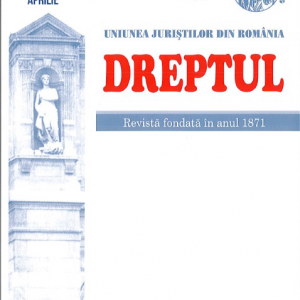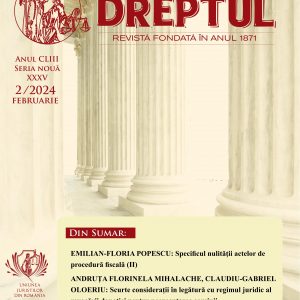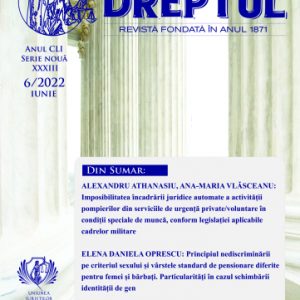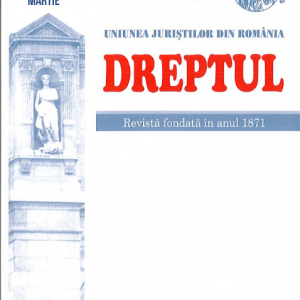-
 Within the international trade relations, risks may currently arise from certain facts or events that result in conflict situations between the parties involved in commercial operations, having as consequence the appearance of the litigation. In this context, a special place is occupied by maritime litigation, a complex, plurivalent dispute, combining elements emerging from international trade law, transport law and maritime law. The present study aims to identify and analyze the main issues that give the maritime litigation a particular nature, conferring it, legally, a specific character compared to other international trade disputes. The objectives of the research are circumscribed to the analysis of the characteristics of the maritime litigation, of the causes of its occurrence and of its conditions of manifestation. Within the paper, special attention was devoted to studying how to instrument the maritime litigations, with the methods of the maritime technique and the legal and economic solutions used in this matter. With regard to the procedures of settlement of maritime litigations, the study focuses on highlighting the operational phases, the analysis of evidence and of other issues that configure the applicable procedural framework in case the parties involved have expressed the option to settle the dispute for the contentious procedure. Examining the specific features of this original type of disagreement has highlighted a pronounced pragmatic character over the theoretical argumentation taking into account the force of maritime or harbour regulations or usages in this field. The notion of maritime litigation and its regulation became outstanding at a stage preceding the emergence of maritime law. Over time, seafarer’s practices have created usages and traditions specific to trade in goods carried by sea, which have led to the unification and even codification thereof in the context of classical maritime law. The scope of the notion of maritime litigation is much wider than that of the maritime trial and has an earlier application over time, whereas only a part of the maritime litigations lead to a proper judicial trial or to a maritime arbitration. Maritime litigations can be defined as disputes between two or more parties involved in the maritime expedition or between the signatory parties to specific contracts used in all activities related to maritime trade. In this regard, disputes of a maritime nature may arise as a consequence of the non-performance or malfunction of maritime transport contracts, so that it is indicated to mention in these contracts some specific clauses, stating the modality and rules for solving such conflict situations, including the jurisdiction clause, since the non-inclusion of this clause raises disputes over the jurisdiction of the courts of such litigious cases. Maritime litigations are dealt with by the specialists in the field both in the ante-judicial and judicial stage, through the correct coordination of the parties involved and the professional settlement of all the litigious aspects. The specialist in maritime litigations should be a person with cumulative competencies in the technical, economic and legal field, maritime navigation and port exploitation. Solving major maritime disputes is a complex and laborious process, which requires pragmatism, accuracy, increased attention, quick decision and efficiency. The general procedure for dealing with this disagreement is carried out on the basis of a strictly technical, specialized methodology and requires going through several phases such as the finding the occurrence of the event or conflict-generating act, the notification of the parties involved, the collection and preservation of the evidence for defence or for the drawing up of the complaint, quantifying and filing the complaint, taking a decision on the modality of approach, the negotiation and pronunciation of the solution to finalize the case. The resolution of maritime litigations is based on the case law in the field, strongly influenced by international maritime conventions and on the relations created between the rules from various law systems, applicable in the field, in the context of assimilation and implementation of the international trade usages.
Within the international trade relations, risks may currently arise from certain facts or events that result in conflict situations between the parties involved in commercial operations, having as consequence the appearance of the litigation. In this context, a special place is occupied by maritime litigation, a complex, plurivalent dispute, combining elements emerging from international trade law, transport law and maritime law. The present study aims to identify and analyze the main issues that give the maritime litigation a particular nature, conferring it, legally, a specific character compared to other international trade disputes. The objectives of the research are circumscribed to the analysis of the characteristics of the maritime litigation, of the causes of its occurrence and of its conditions of manifestation. Within the paper, special attention was devoted to studying how to instrument the maritime litigations, with the methods of the maritime technique and the legal and economic solutions used in this matter. With regard to the procedures of settlement of maritime litigations, the study focuses on highlighting the operational phases, the analysis of evidence and of other issues that configure the applicable procedural framework in case the parties involved have expressed the option to settle the dispute for the contentious procedure. Examining the specific features of this original type of disagreement has highlighted a pronounced pragmatic character over the theoretical argumentation taking into account the force of maritime or harbour regulations or usages in this field. The notion of maritime litigation and its regulation became outstanding at a stage preceding the emergence of maritime law. Over time, seafarer’s practices have created usages and traditions specific to trade in goods carried by sea, which have led to the unification and even codification thereof in the context of classical maritime law. The scope of the notion of maritime litigation is much wider than that of the maritime trial and has an earlier application over time, whereas only a part of the maritime litigations lead to a proper judicial trial or to a maritime arbitration. Maritime litigations can be defined as disputes between two or more parties involved in the maritime expedition or between the signatory parties to specific contracts used in all activities related to maritime trade. In this regard, disputes of a maritime nature may arise as a consequence of the non-performance or malfunction of maritime transport contracts, so that it is indicated to mention in these contracts some specific clauses, stating the modality and rules for solving such conflict situations, including the jurisdiction clause, since the non-inclusion of this clause raises disputes over the jurisdiction of the courts of such litigious cases. Maritime litigations are dealt with by the specialists in the field both in the ante-judicial and judicial stage, through the correct coordination of the parties involved and the professional settlement of all the litigious aspects. The specialist in maritime litigations should be a person with cumulative competencies in the technical, economic and legal field, maritime navigation and port exploitation. Solving major maritime disputes is a complex and laborious process, which requires pragmatism, accuracy, increased attention, quick decision and efficiency. The general procedure for dealing with this disagreement is carried out on the basis of a strictly technical, specialized methodology and requires going through several phases such as the finding the occurrence of the event or conflict-generating act, the notification of the parties involved, the collection and preservation of the evidence for defence or for the drawing up of the complaint, quantifying and filing the complaint, taking a decision on the modality of approach, the negotiation and pronunciation of the solution to finalize the case. The resolution of maritime litigations is based on the case law in the field, strongly influenced by international maritime conventions and on the relations created between the rules from various law systems, applicable in the field, in the context of assimilation and implementation of the international trade usages. -

-

-
 The paper intends to emphasize the importance and echo of the motivation of jurisdictional acts given in the operation of individualization of procedural measures, with emphasis on preventive measures in criminal proceedings. The analysis is imposed in the recent social and legal context, in which the individual freedom of the person is subjected to particular trials and must be preserved, an objective finally achievable through the analysis and rigorous argumentation of the acts of disposition elaborated by the judicial bodies.
The paper intends to emphasize the importance and echo of the motivation of jurisdictional acts given in the operation of individualization of procedural measures, with emphasis on preventive measures in criminal proceedings. The analysis is imposed in the recent social and legal context, in which the individual freedom of the person is subjected to particular trials and must be preserved, an objective finally achievable through the analysis and rigorous argumentation of the acts of disposition elaborated by the judicial bodies. -
 This article aims to analyze a wage increase for people who traditionally have a PhD title and are working in the field in which they obtained this title. Up to the adoption of the legislation on uniform remuneration in budgetary system, all those who had obtained a PhD title received, without distinction, a wage increase for PhD. The current legislation has provided the inclusion of this increase, as a transitional compensatory amount, in the base salary, the basic pay/salary or monthly allowance, for the employees that had it to be paid on 31 December 2009, but not for those who have won the PhD title after this date. That legislation created a discriminatory situation, on which the National Council for Combating Discrimination was notified, and this has expressed a specialised opinion, which advocated for the competent authorities of the State, Parliament and the Government to proceed to eliminate the difference in legal treatment, so additional salary entitlement to be recognized by the legislature to all employees, regardless of the date on which it was awarded a PhD title. To this end we propose the appropriate modification of the law.
This article aims to analyze a wage increase for people who traditionally have a PhD title and are working in the field in which they obtained this title. Up to the adoption of the legislation on uniform remuneration in budgetary system, all those who had obtained a PhD title received, without distinction, a wage increase for PhD. The current legislation has provided the inclusion of this increase, as a transitional compensatory amount, in the base salary, the basic pay/salary or monthly allowance, for the employees that had it to be paid on 31 December 2009, but not for those who have won the PhD title after this date. That legislation created a discriminatory situation, on which the National Council for Combating Discrimination was notified, and this has expressed a specialised opinion, which advocated for the competent authorities of the State, Parliament and the Government to proceed to eliminate the difference in legal treatment, so additional salary entitlement to be recognized by the legislature to all employees, regardless of the date on which it was awarded a PhD title. To this end we propose the appropriate modification of the law. -
 In the judicial practice, there are divergent opinions regarding the settlement of cases in which the reports drawn up by the Labor Inspection are contested, invoking the inexistence of work accidents. Some courts have considered that the litigation should be tried by the administrative sections in the courts of law, others have decided that trial courts have the competence required to solve the case in the first instance and a third opinion is that of dealing with the case separately and of solving the aspects regarding the administrative sanctions and, respectively, the nature of the accident by different courts. The author considers that the complaints against this type of reports fall under the jurisdiction of trial courts and not under the jurisdiction of administrative courts.
In the judicial practice, there are divergent opinions regarding the settlement of cases in which the reports drawn up by the Labor Inspection are contested, invoking the inexistence of work accidents. Some courts have considered that the litigation should be tried by the administrative sections in the courts of law, others have decided that trial courts have the competence required to solve the case in the first instance and a third opinion is that of dealing with the case separately and of solving the aspects regarding the administrative sanctions and, respectively, the nature of the accident by different courts. The author considers that the complaints against this type of reports fall under the jurisdiction of trial courts and not under the jurisdiction of administrative courts. -
 In the judicial practice, there are divergent opinions regarding the settlement of cases in which the reports drawn up by the Labor Inspection are contested, invoking the inexistence of work accidents. Some courts have considered that the litigation should be tried by the administrative sections in the courts of law, others have decided that trial courts have the competence required to solve the case in the first instance and a third opinion is that of dealing with the case separately and of solving the aspects regarding the administrative sanctions and, respectively, the nature of the accident by different courts. The author considers that the complaints against this type of reports fall under the jurisdiction of trial courts and not under the jurisdiction of administrative courts.
In the judicial practice, there are divergent opinions regarding the settlement of cases in which the reports drawn up by the Labor Inspection are contested, invoking the inexistence of work accidents. Some courts have considered that the litigation should be tried by the administrative sections in the courts of law, others have decided that trial courts have the competence required to solve the case in the first instance and a third opinion is that of dealing with the case separately and of solving the aspects regarding the administrative sanctions and, respectively, the nature of the accident by different courts. The author considers that the complaints against this type of reports fall under the jurisdiction of trial courts and not under the jurisdiction of administrative courts. -
 The present study aims to emphasize the current state of the principles of ethics in the field of artificial intelligence world-wide, respectively in the Western world (especially the European Union and the United States of America), Russia and China. The author set out to create the necessary debate framework for the importance of raising awareness of this area and of its impact on everyday life. Finally, the study also presents the author’s conclusions on what is ethically important at its intersection with the field of law. Being a new constituent element of contemporary reality, artificial intelligence can no longer be ignored. It is obvious that at present there are missing the binding regulations which give an adequate answer to the problems generated by the arising and functioning of artificial intelligence. Due to the extraordinary, unknown, even unpredictable implications, it will not be possible to create the specific legislation in such a way as to meet the expectations unless a rigorous ethical analysis is done in advance. The study identifies documents issued by state authorities and private entities in which an ethical perspective is taken in relation to the field of artificial intelligence and draws a conclusion on its importance. The author also offers his own perspective on the important ethical principles, in particular, from the perspective of the legal field.
The present study aims to emphasize the current state of the principles of ethics in the field of artificial intelligence world-wide, respectively in the Western world (especially the European Union and the United States of America), Russia and China. The author set out to create the necessary debate framework for the importance of raising awareness of this area and of its impact on everyday life. Finally, the study also presents the author’s conclusions on what is ethically important at its intersection with the field of law. Being a new constituent element of contemporary reality, artificial intelligence can no longer be ignored. It is obvious that at present there are missing the binding regulations which give an adequate answer to the problems generated by the arising and functioning of artificial intelligence. Due to the extraordinary, unknown, even unpredictable implications, it will not be possible to create the specific legislation in such a way as to meet the expectations unless a rigorous ethical analysis is done in advance. The study identifies documents issued by state authorities and private entities in which an ethical perspective is taken in relation to the field of artificial intelligence and draws a conclusion on its importance. The author also offers his own perspective on the important ethical principles, in particular, from the perspective of the legal field. -
 The current standards on the quality, the integrity and the non-disclosure of the professional secret in the interprofessional complementary activities of the Romanian judicial system represent, in the contemporary society, a concern to adjust to the permanently changing reality. The existence of some constants such as independence, competence, responsibility, but also honour, dignity and respect, in reality, receives new meanings, and their convergence is achieved only by way of a various communication. Creating some new modalities to ensure the common professional status is not an illusion, but a real need for the interprofessional dialogue to take place not only within a profession, but within more professions, for the purpose of ensuring the unity in the application of law.
The current standards on the quality, the integrity and the non-disclosure of the professional secret in the interprofessional complementary activities of the Romanian judicial system represent, in the contemporary society, a concern to adjust to the permanently changing reality. The existence of some constants such as independence, competence, responsibility, but also honour, dignity and respect, in reality, receives new meanings, and their convergence is achieved only by way of a various communication. Creating some new modalities to ensure the common professional status is not an illusion, but a real need for the interprofessional dialogue to take place not only within a profession, but within more professions, for the purpose of ensuring the unity in the application of law. -
 Introducere. O justiție perfectă nu poate fi concepută fără respectarea valorilor, a principiilor fundamentale, nu poate fi imaginată în afara unei societăți care mai înainte de a fi dreaptă trebuie să fie una civilizată. Societatea întemeiată pe principiile statului de drept a devenit o formulă pe care o auzim rostită pretutindeni, reluată obsesiv, ca un laitmotiv fără de care nu începe și nici nu se poate sfârși o zi. Garanția statului de drept nu poate fi întemeiată decât pe o justiție echitabilă, imparțială și eficientă
Introducere. O justiție perfectă nu poate fi concepută fără respectarea valorilor, a principiilor fundamentale, nu poate fi imaginată în afara unei societăți care mai înainte de a fi dreaptă trebuie să fie una civilizată. Societatea întemeiată pe principiile statului de drept a devenit o formulă pe care o auzim rostită pretutindeni, reluată obsesiv, ca un laitmotiv fără de care nu începe și nici nu se poate sfârși o zi. Garanția statului de drept nu poate fi întemeiată decât pe o justiție echitabilă, imparțială și eficientă -
 The authors intend, in the first part of the article, to clarify, based on decisions made by the European Court of Human Rights, the meaning of “criminal charge” in relation to the provisions of art. 6 of the (European) Convention for the protection of human rights and fundamental freedoms, while in the second part of the article, they review the effects of the decision made in the case Anghel vs. Romania on the national legal framework and on case law.
The authors intend, in the first part of the article, to clarify, based on decisions made by the European Court of Human Rights, the meaning of “criminal charge” in relation to the provisions of art. 6 of the (European) Convention for the protection of human rights and fundamental freedoms, while in the second part of the article, they review the effects of the decision made in the case Anghel vs. Romania on the national legal framework and on case law. -
 The principle of loyalty of evidence is a jurisprudential principle of the European Court of Human Rights. The author intended to provide an overall presentation of its evolution, both from the case law perspective and from the legislative point of view.
The principle of loyalty of evidence is a jurisprudential principle of the European Court of Human Rights. The author intended to provide an overall presentation of its evolution, both from the case law perspective and from the legislative point of view.
